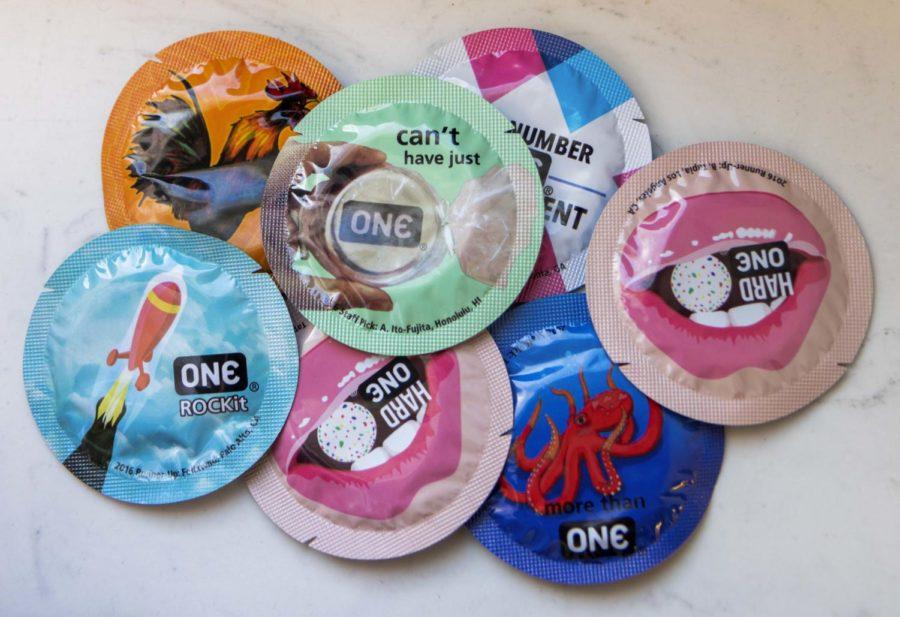Opinion | Purity culture is preventing us from living our best sex lives


Condoms in the Wellness Center waiting room in 2019.
Hi mom and dad, please skip this column.
‘Tis the season of love, which sounds weird considering we should love our people the same all year round. Anyways, the topic of love and sex comes up a lot this time of year, when everything is pink and red, and heart-shaped everything is marketed like crazy.
Despite America’s weird fascination with Valentine’s Day, our society doesn’t treat our most intimate interactions with matched enthusiasm. I want that to change.
The influence from purity culture is preventing us from having our best sex, simply because it’s hindering the personal conversations that validate our experiences. It’s why people keep having bad sex, because they don’t even know that better experiences await.
Although traditional purity culture — the idea that people should abstain from sex until marriage — exists in evangelical Christian faith, it has leaked into our society at-large and shifted some of our views about sex and intimacy, especially for women. It’s almost like that separation between church and state has a few cracks in it.
To me, it explains why I was taught abstinence-only sex education at my public high school, and why students across the country aren’t taught what sex is or how to be safe when engaging in it.
Yet within the same walls that didn’t provide me the necessary teachings on sex and health, Dr. C. Thomas Brophy spoke to my class during my senior year. During his presentation, he talked about things the human brain is programmed to seek out, and one of the things he mentioned — besides food, water, shelter — was sex.
It was in that time and place that it clicked — wanting sex is an extremely animal expereince, and humans are animals, too. We are programmed to want sex and have even evolved to find it pleasurable.
Although that little part in our head telling us to become aroused or have sex is primal, it also enables us to want to have sex … and we should!
Wanting to find sex pleasurable is nothing to be ashamed of, but the only way we can accomplish this is if space is created and held where people feel comfortable being curious about their sexuality and preferences — even if they aren’t planning on having sex soon.
Even with abstinence-only sex education and societal pressures stigmatizing sex, our culture is the most sex positive and progressive it has ever been, but there are still incredible definciencies.
Women particularly have a difficult time with sex, but to no fault of their own. There’s an orgasm gap, and just like the pay gap, it sucks.
According to a study conducted by the Archives of Sexual Behavior that surveyed more than 52,000 American adults, 95% of heterosexual men reported that they almost nearly or did orgasm every time they had sex. That amount drops to 65% for heterosexual women, which is the group least likely to orgasm out of all groups surveyed — gay, lesbian, bisexual and heterosexual men and women.
An article published by the Journal of Experimental Zoology titled “The Evolutionary Origin of Female Orgasm” details that human females orgasm inconsistently during sex, particularly without clitorial stimulation. The article says women are more likely to orgasm during masturbation or homosexual intercourse than during heterosexual intercourse, which goes against mainstream portrayals of female sexual pleasure.
So while most men are able to orgasm during intercourse, the same is not true for some women, and consequently female pleasure often isn’t prioritized, which can account for these low rates.
When we finally figure out what feels good to us, we see the benefits — especially in loving relationships. Love does enhance sex, but it’s not a prerequisite for intercourse.
The benefits of having quality sex for women are lower blood pressure rates, improvements in immunity, better heart health, improved self-esteem, decreased depression and anxiety, better sleep and overall stress reduction, both physiologically and emotionally.
So not only can sex feel good, it can literally improve the quality of life for women.
Although sex is all around us — in television shows, movies, books and just about any other form of media and communication you can think of — we aren’t engaging with it on a personal level. We approach sex as a general topic, a one-size-fits-all approach, but it’s not serving us in the ways we need it to.
We need to talk about our experiences as individual humans with diverse experiences. Our collective knowledge is what will allow us to grow and further develop.
It is up to our generation to disolve the reminisce of sexual taboo that remains. Embracing a sex-positive outlook is how we can accomplish this.
You have one precious life. Please don’t waste it having bad sex.
Grace DeLallo writes about social, environmental and political issues. Write to her at gkd5@pitt.edu.
Recent Posts
Notes From an Average Girl | New job same me
In this edition of Notes From an Average Girl, senior staff writer Madeline Milchman writes…
Who Asked? // Why is failure so scary?
This installment of Who Asked? by staff writer Brynn Murawski tackles something scarier than any…
Faith’s Findings // Study Spots
In this edition of Faith’s Findings, staff writer Faith Richardson explores new places around campus…
A Good Hill to Die On // Dress to Impress or Dress to Invest
This release of “A Good Hill to Die On” discusses the controversial topic of whether…
Muslim theater student felt ‘forced’ out of play over script concerns
A disagreement between a hijabi student actress and a Pitt playwright have made some in…
Pitt Stages brings back the ‘90s in boy-band-centric play ‘Morning Reckoning’
The world premiere of “Morning Reckoning,” a two-act ode to the 1990s, boy bands, fandom,…

